We’re on a ferris wheel in 1986, and it’s dusk — from here we can’t see anything below but distant lights, and two women are sitting close together. They’re holding hands and talking over the bolts rattling in the wind.
Snap and we’re in 2004, in a tense conversation while two toddlers are falling asleep and the snow is falling. Snap and we meet in a doctor’s office in a year that hasn’t happened yet — We’re in a long and deep relationship and a play that weaves two lives together through time. On June 5, in celebration of Pride month, WAM Theatre will give a staged reading of Tanya Barfield’s Bright Half Life, at Mass MoCA.
The play tells the story of two women, Vicky and Erica. It’s a love story, says director Gina Kaufman, and she finds it intensely potent.
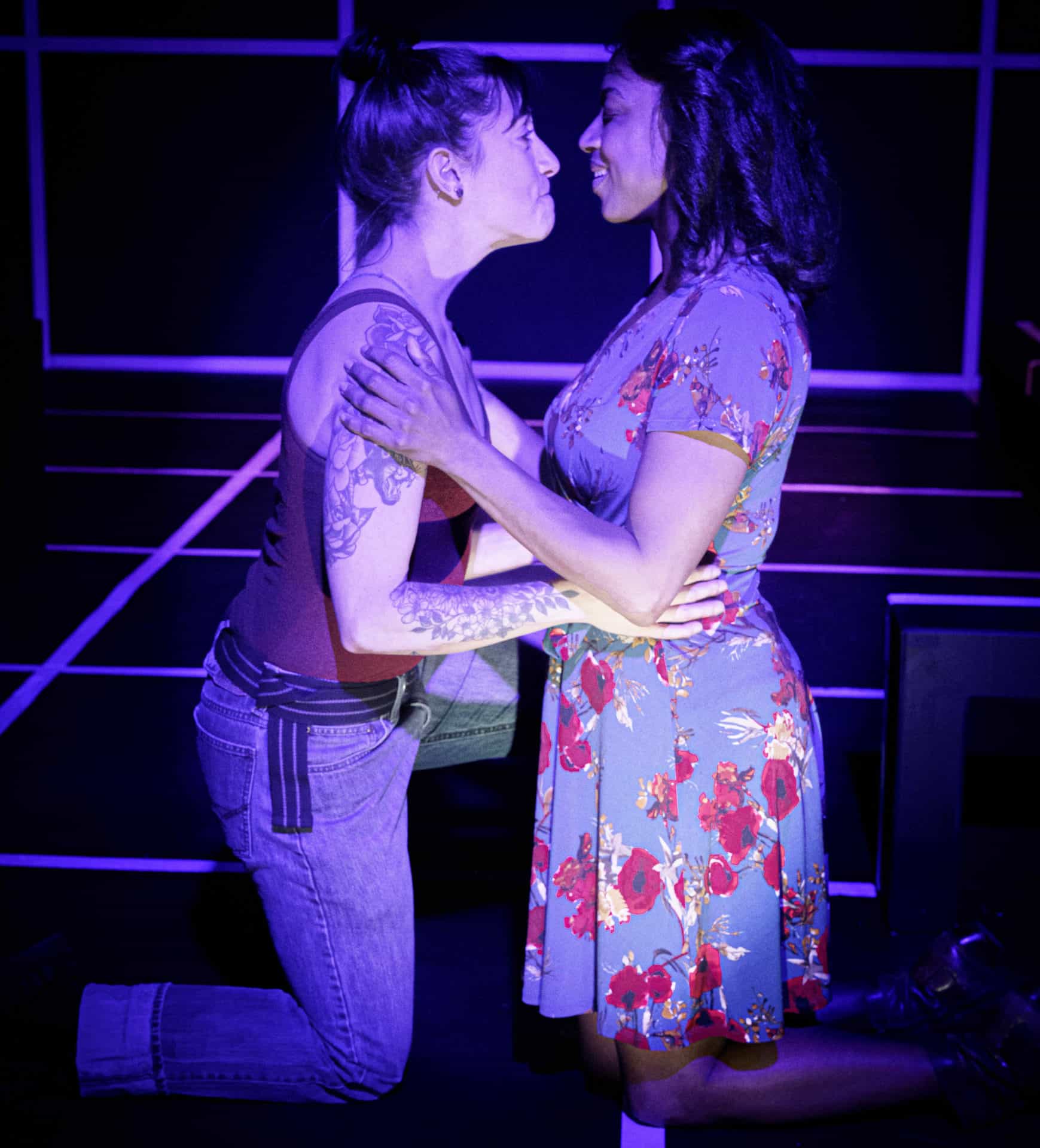
Kyle Boatwright (right) as Vicky kneels with Erica, actor Katie Mack, in Bright Half Life at the Silverthorne Theater, directed by Gina Kaufmann. Press photo courtesy of Silverthorne Theater
“The first time I read this play I did cry, and I did find it beautiful,” she said. “And what I felt is that the way time shifts in this play is actually more poetically real than anything chronological.
‘The first time I read this play I did cry, and I did find it beautiful.’ — Gina Kaufman, director
“And memory also for me works in this fragmented way, where I experience a person I love in the present, and if it’s been a long time — this play takes place in the course of 45 years — if you have that much time, your memories are not ordered, and some shine out and repeat themselves and shift each time.”
So Vicky and Erica live their story in heightened moments, she said, in the times when you feel all of your senses are engaged. They become the times you come back to, and experiences later on hold all the ones before.
“Whatever the hard times,” Kaufman said, “and whatever the mistakes, they are soulmates.”
‘Whatever the hard times, and whatever the mistakes, they are soulmates.’ — Gina Kaufman
Barfield affirmed this understanding for her, she said. She had the chance to talk about the play and ask Barfield what she sees as pitfalls in performing it, and Barfield told her first, forgetting Erica and Vicky’s closeness and treating the play as a tragedy.
“It’s beautiful,” Kaufman said. “They love each other so much. So just holding on to that, despite all the ways they go, is really important to me.”
She has directed the play before, and with Pioneer Valley actor and musician Kyle Boatwright as Vicky, in a performance with the Silverthorne Theater in Greenfield. Fellow Northampton performer Rachel F. Hirsch joins them now as Erica.
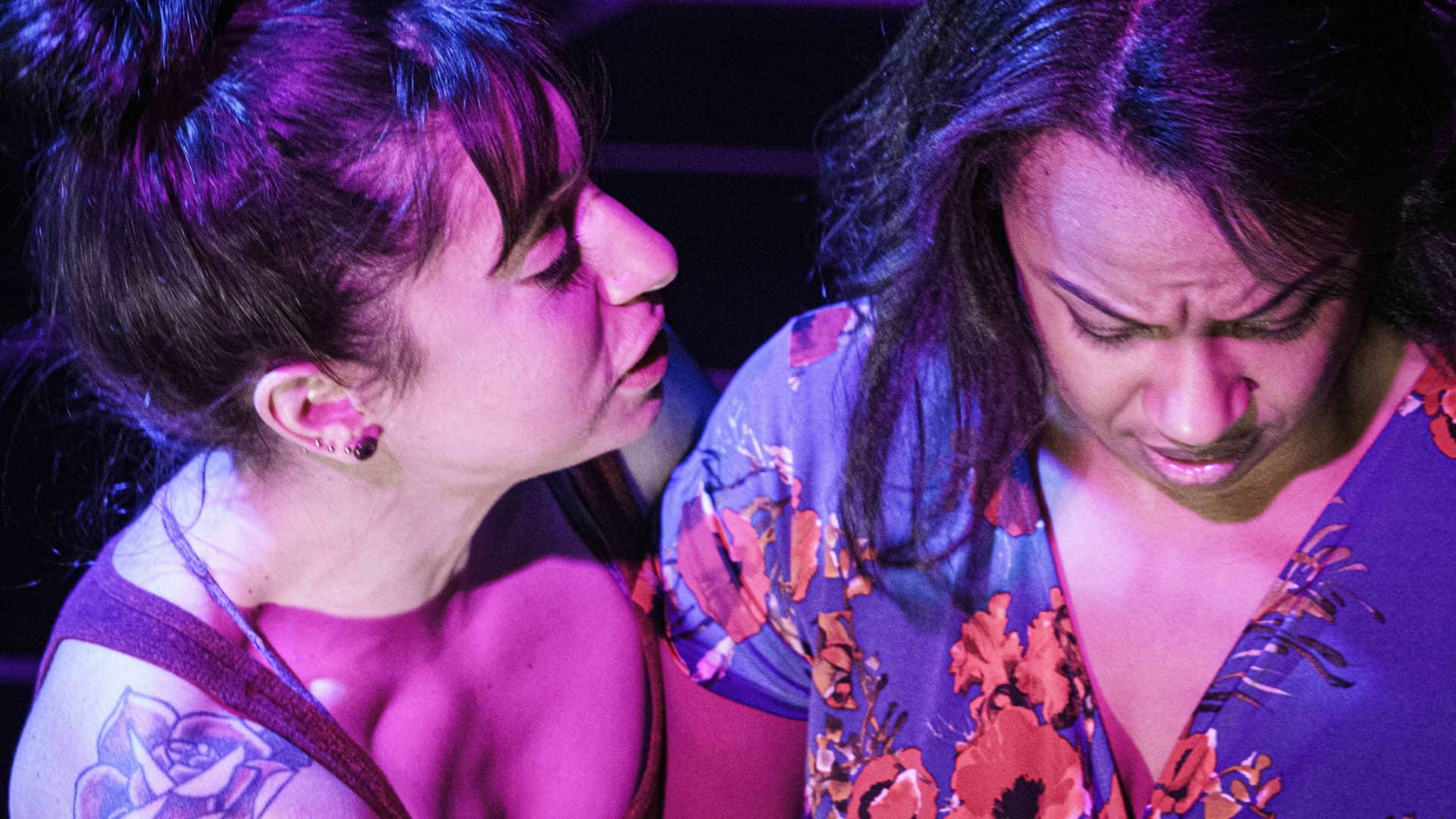
Kyle Boatwright (right) appears in Bright Half Life at the Silverthorne Theater, with Equity actor Katie Mack as Erica, directed by Gina Kaufmann. Press photo courtesy of Silverthorne Theater
Boatwright sees Vicky with warmth and clear-eyed compassion — a focused, resourceful woman, often willing to get out and do what needs doing, wrestling with her identity and not out to her family
“You can see how independent she is,” Boatwright said, “and it’s out of necessity. … She doesn’t have the support for her full self from her parents, and so she’s used to doing that herself.”
She and Erica can strengthen each other, she said, when they can interweave and balance. She sees Erica as a beautiful, free-loving spirit, and in some ways centered in herself … and in other ways frustrated and insecure. In almost the first words the audience will hear, when Erica and Vicky are in their 20s, and they have already been together and apart, Erica comes to Vicky’s door and tells Vicky her father is dying.
Boatwright gently touches the web of need and connection between them, as Erica says in effect, I am grieving for somebody who, for better or for worse, took care of me — will you please take care of me now.
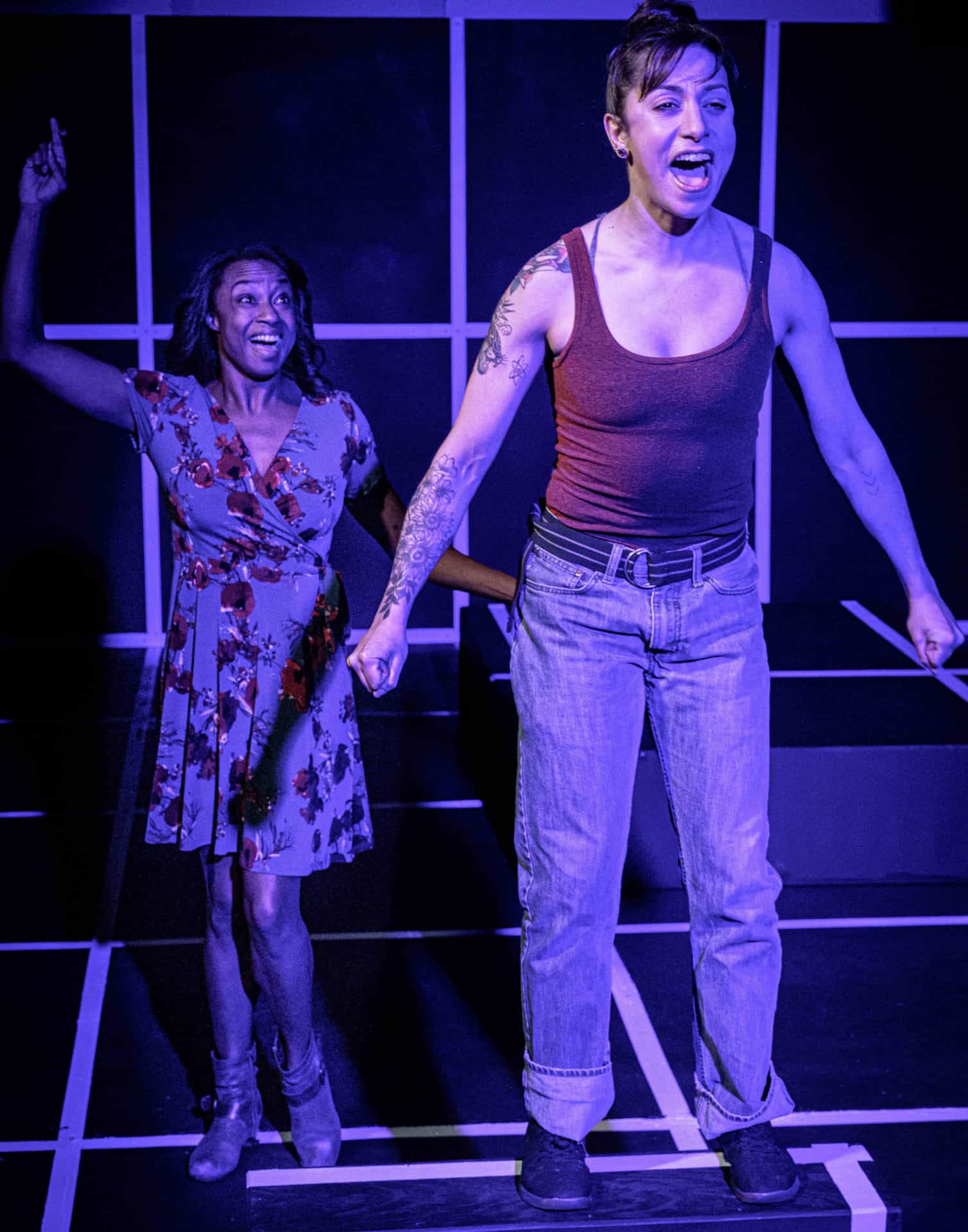
Erica, with Equity actor Katie Mack, stands poised to skydive as per partner, Vicky, encourages her in Bright Half Life at the Silverthorne Theater, directed by Gina Kaufmann. Press photo courtesy of Silverthorne Theater
“And yet we also see (Erica) having more confidence in certain aspects of her life,” Hirsch said, “in her queerness especially, really being able to step into that and own it in a way that Vicky isn’t ready to yet.”
“… You see the wonderful and the terrible (in their relationship), and everything in between, and that is so compelling to me, because that feels so much more real.”
That reality has deeply moved WAM’s General Manager, Dori Parkman, who has spoken out for bringing this play to the Berkshires. She says the story will feel familiar for anyone who has ever had a bad breakup, fallen in love, had children — and it has meant more for her, because she sees herself in it. Like Kaufman, she felt her first contact with this play intensely.
“I felt like I saw my life played out on stage,” she said. “… I came out later in life. I was in my 20s — people now figure it out much younger.”
As she was growing up and realizing who she was, she felt a kind of grief, she said, because it seemed impossible to her then that she would ever be able to marry or have children. And it was hard for her, believing she would have to give up even the possibility of such significant parts of life to be who she was.
She felt the characters living through experiences she would have given anything then to have seen, and experiences she now understands, recalling her own memories of falling in love with her now-ex-wife, adopting their children and going through the pain of separation.
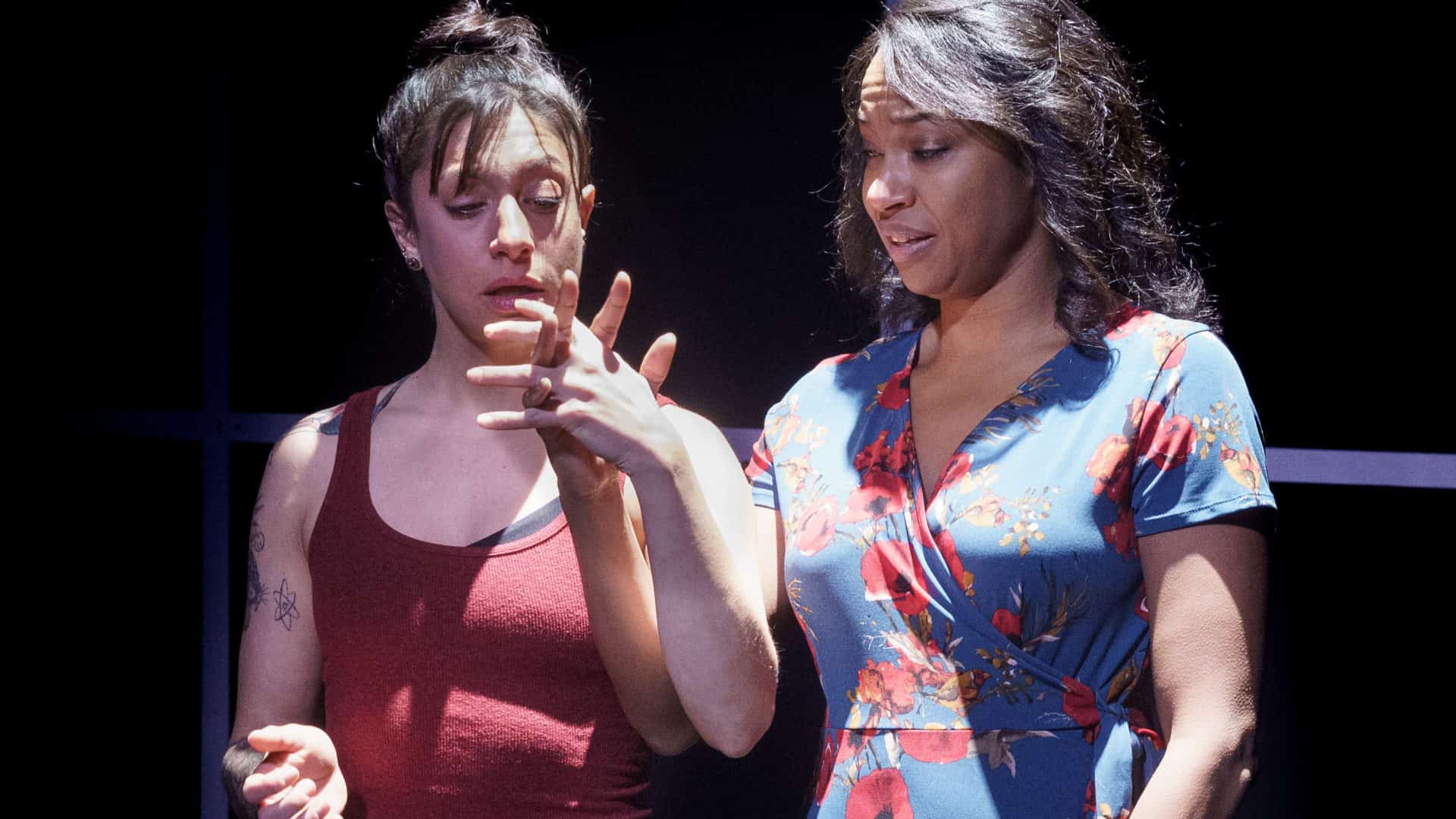
Kyle Boatwright (right) appears in Bright Half Life at the Silverthorne Theater, with with Equity actor Katie Mack as Erica, directed by Gina Kaufmann. Press photo courtesy of Silverthorne Theater
The play explores the tensions and dreams in any long relationship, she and the actors said, and more — the pressures Erica and Vicky face as two women who meet in 1985 and have been together close to 20 years before they can legally marry — and with them, the pressures in an interracial relationship.
Boatwright felt another difficult and powerful reality in scenes when Vicky calls on Erica to see the challenges Vicky faces every day, in moving through the world and in navigating her professional life with persistence and achievement.

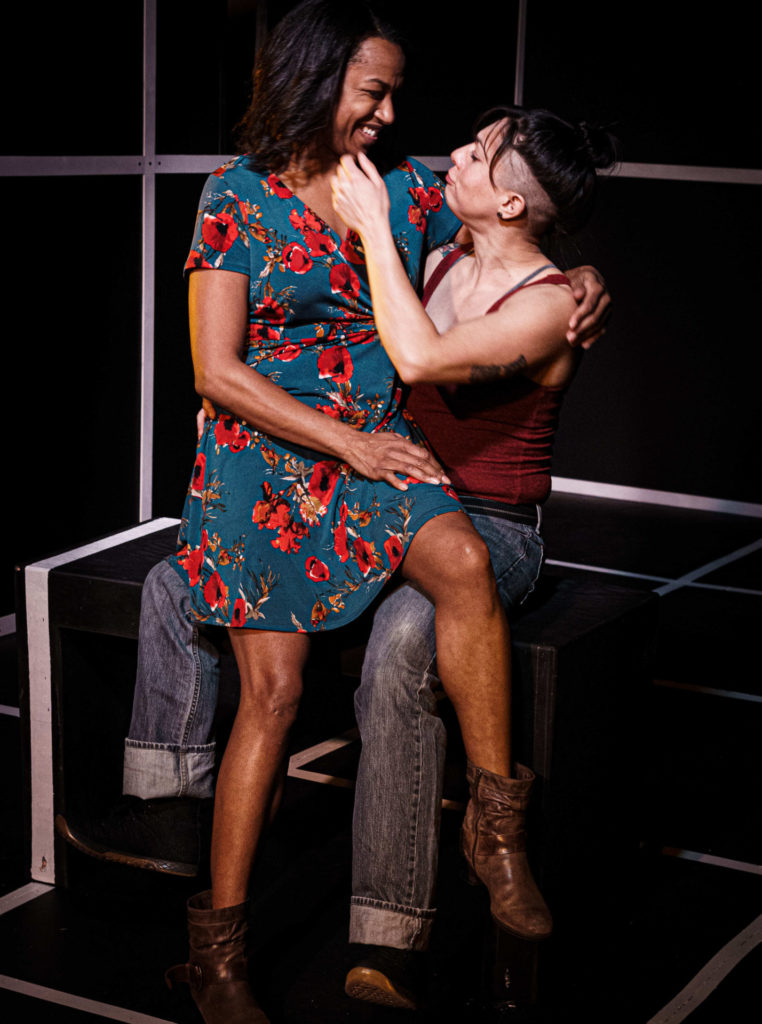
“She’s done the work. Necessarily,” Boatwright said. “Let’s not forget, she is a Black woman. If you’re a woman, you’ve got to work twice as hard — if you’re a black woman you’ve got to work four times as hard to get to the point — so you end up surpassing most of the white men sometimes, and you still don’t get the credit or the money or the energy that you deserve to get.
“But… one of the lines for me that hits the hardest — Erica says it — I understand that you can’t afford to be anything less than perfect.
‘One of the lines for me that hits the hardest — Erica says it — ‘I understand that you can’t afford to be anything less than perfect.’ That notion, for me, as a Black women, has been the thing my entire life.’ — Kyle Boatwright
“That notion, for me, as a Black women, has been the thing my entire life. Starting from going to school, how do I be an overachiever, how do I get into the best school possible because I have to, because if I don’t go to college then my options are limited because I am a black woman — if I don’t do well in this job then I’m going to look horrible, and I’m more disposable than the next person, so I have to be perfect.
“I have to be early, because if I’m not early then I look like the stereotype of being late all the time because I’m a Black woman. If I am not perfect, then I don’t get it. I don’t get life. And so I have to give everything, because otherwise I have nothing.”
Vicky and Erica have both felt the world bear down on them. They have faced hostility and anger, and in different ways they have held the courage to be who they are.
‘I feel like so much about this play comes down to both women wanting to be really, truly seen by their partner, in every instance.’ — Rachel Hirsch
“I feel like so much about this play comes down to both women wanting to be really, truly seen by their partner, in every instance,” Hirsch said. “I think too often we assume our soulmate, our partner, the person we’re so drawn to is just going to inherently know exactly who we are in every situation, in every moment. And the truth is that we are an ever-evolving species — we’re constantly changing, and the way we need to be seen changes.”
“And it’s brilliantly written,” Kaufman said. “… It’s always based in relationship and humanity.”
“… It is so real and so human and so genuine,” Boatwright said, “and neither of us is the good guy or the bad guy here — we’re just trying to do the thing that we want to do, which is love each other. … And we always find the way back to each other. No matter how long it takes, we always find the way back.”

